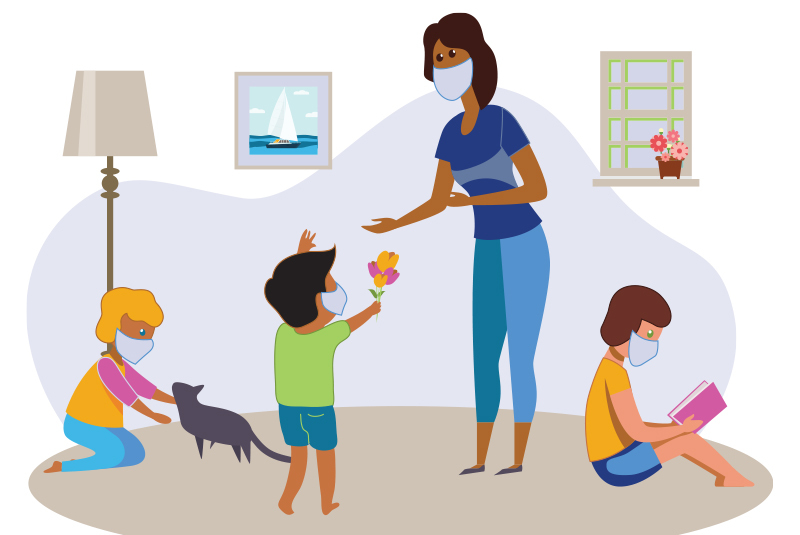How Boston Children’s is supporting childcare during COVID-19

If you’re a parent who relies on childcare, you may be struggling with closures during COVID-19. You also may have questions about the reopening and the safety of the childcare classroom. For people who live in communities of color, which are disproportionately impacted by COVID-19, the challenges associated with childcare are magnified.
That’s why Boston Children’s Hospital is supporting childcare providers in Boston, especially those serving children and families most impacted by health disparities and living in low-income neighborhoods.
“COVID-19 has truly turned our lives upside down. We’ve been working with the Department of Early Education and Care (EEC) to help answer questions about how to best provide childcare in the ‘new normal,’” explains Sandra Fenwick, Boston Children’s CEO.
Fenwick and a panel of experts addressed some common concerns on this topic during a recent webinar on early childhood development that was co-hosted by Boston Children’s and the EEC.
What you need to know about childcare reopening
Here are some of the key points they addressed about the re-opening process.
- Reopening daycare centers requires providers to meet a strict set of health and safety requirements.
As Massachusetts proceeds with reopening the economy, childcare providers are able to open — but only if they meet a strict set of health and safety requirements designed to protect children and caregivers. Boston Children’s reviewed the clinical content of the guidelines for providers reopening and worked with EEC to provide an educational webinar to support providers implementing the guidelines. The requirements for reopening include submitting a safety plan to EEC with plans for daily health screenings, class sizes that allow for physical distancing, educators wearing masks and children wearing masks as tolerated, avoiding shared food, toys, and other objects, and frequent cleaning of high-touch surfaces. Providers must also share how they plan to identify and isolate anyone who is ill in order to minimize exposure to others.
- Putting the guidelines into place can be time intensive and expensive for many local childcare providers.
Now that the steps needed to reopen have been shared, implementing them can be complicated — especially for childcare providers who have been closed for the past few months with little or no income. They may find that retaining staff, providing updated training, and purchasing supplies can be difficult or even impossible. Many programs may be unable to open without assistance and some of them could even go out of business. For neighborhoods that are already impacted by COVID-19, this can be another tragedy if children don’t have access to safe and high-quality care so their parents can work.
- Boston Children’s is providing financial support and resources to childcare providers in Boston.
In response to the current crisis, Boston Children’s has announced that we are offering support for childcare providers that are struggling and meet certain criteria. “This August, we launched the Boston Childcare Support Initiative and will distribute $239,000 to support 48 childcare providers in the neighborhoods of Boston with the highest concentration of children and Black and Latino families,” says Fenwick. The grants, which range from $3,500 to $10,000, are going to childcare providers located in Dorchester, Mattapan, Roxbury, Hyde Park, and East Boston. Additional funds will be released this fall to support more childcare providers.
“We’re hoping this support will help them get back into the new normal,” she adds.
In addition to contributing to reopening costs, the money can also be used to sustain the programs over the next 12 months.
Other ways we are helping childcare providers
Boston Children’s is also working to provide additional education and training on how programs can operate during the pandemic, and help guide them on how to continue their important role in early childhood development amid all of the necessary changes.
Here are some of the key recommendations:
- Parents and childcare providers need to establish a strong channel of communication during this stressful time to ensure everyone is on the same page and knows what to expect.
- There should be age-appropriate communication with children about the changes that are being implemented and why. This can help children know they are safe and can feel comfortable.
- Parents should stay in close touch with their pediatricians, who can answer questions about any symptoms that arise and help families determine when to send a child to childcare and when to keep them home. Since the signs of COVID can look different in different people, this is especially important to avoid exposing other children and staff.
Strengthening communities
While the current situation may be overwhelming for working parents right now, Dr. Shari Nethersole, executive director of Community Health at Boston Children’s, says that in the midst of this crisis also comes opportunity. As childcare centers figure out how to reopen, there is growing awareness about the need for more funding and investment in the most at-risk and often marginalized communities.
Learn more about our response to COVID-19 and access a list of community resources.
Related Posts :
-

Model enables study of age-specific responses to COVID mRNA vaccines in a dish
mRNA vaccines clearly saved lives during the COVID-19 pandemic, but several studies suggest that older people had a somewhat reduced ...
-

Making pediatric health equity research truly equitable: An EDI review process
A burgeoning number of studies are examining pediatric health equity, diversity, and inclusion (EDI). But if not done right, health ...
-

New insight into the effects of PPIs in children
Proton-pump inhibitors (PPIs) are frequently prescribed to suppress stomach acid in patients with gastroesophageal reflux disease (GERD). Prescribing rates of ...
-

Creating the next generation of mRNA vaccines
During the COVID-19 pandemic, mRNA vaccines came to the rescue, developed in record time and saving lives worldwide. Researchers in ...





